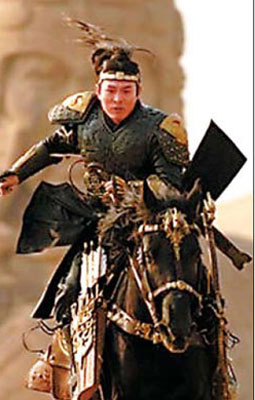Zhang Jinzhan recalls that there were two separate canteens for Chinese and international staff when they shot Kill Bill. It was not until Quentin took the lead to eat in the Chinese staff's canteen that there was more effective communication.
Zhang participated in eight more international productions later, including The Kite Runner. What impressed him most was the different working styles in Hollywood and China.
"They have a very clear schedule. The time to arrive and time to take a break is clearly defined," he says. "The crew will take at least one day break each week. This is almost impossible in Chinese productions. We don't stop until the day ends, struggling every minute to finish quickly."
Zhang says professionalism is the most important thing he has learned from his international team.
He recalls the instance when they needed to move some big boxes to another shooting location. Seeing that the foreign staff in charge of the props was a lady, Zhang gave a shout to all the crew, just like he always did when shooting Chinese films. In a second, four to five young men, from various departments, rushed to the boxes and moved them rapidly. But the next day the lady came to him, firmly telling him not to interfere in her business. Zhang felt confused, but the producer told him, she was a professional. "Although you meant to help, the guys were not professionals. Let everybody do his own job," he says.

The Mummy: The Tomb of the Dragon Emperor, starring Jet Li, revolves around the story of China's first emperor Qin Shihuang.
Despite differences, Spottiswoode says he had a good time cooperating with his Chinese crew, who were diligent and devoted to work. "I think there is always so much to learn from another country and particularly from China where there is a tradition of fascinating films. The last few years, in particular, have shown us filmmakers who have a wonderful vision and eye," he says. "Chinese crews seem to be indomitable and however difficult the circumstances, they never balk."
The communication gap has given rise to a group of Chinese filmmakers familiar with both Western and Chinese filmmaking styles. Zhang Jinzhan admits that the entry of international studios and talents will have impact on the local industry, but he sees more opportunities than crises.
"Co-productions are the best chance for young talents to learn new techniques, use sophisticated equipment and think of a global market," Zhang says. "By cooperation, more and more Chinese filmmakers will be acknowledged by international studios, just as in the case of choreographer Yuen Woo-ping and cinematographer Peter Pau, who play significant roles in The Forbidden Kingdom."
(China Daily April 29, 2008)